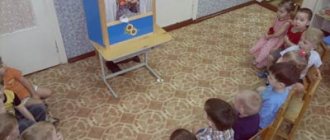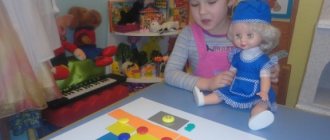Cartoons, games on computers, smartphones, tablets. Influence on the child's speech.
Nowadays, you can quite often find children 2-3 years old who not only don’t speak, but also don’t respond to their own name, but in 20 seconds they can connect to the Internet on someone else’s phone to play with toys. How this delights adults: “He’s so smart! He plays educational games!”
What development do parents expect their child to achieve from tablet games? Understanding of speech, development of vocabulary, thinking functions (comparison, generalization, exclusion), attention, memory - that is, what is usually taught in kindergartens.
I watched how children played these tablet games and what they learned. I found out. They learn to move their finger well and remember the necessary images. See for yourself. The child cannot read the task of the game, he cannot even understand the task that is voiced by the voice-over. He tries to solve the problem “at random”, i.e. moves one element, if it does not fall into place, selects another element, third, fifth... Finally, he got it. Let's try the next one. Repeat the same actions. If he plays the same game again, he will start doing the same actions again. Over time, the child will simply remember the sequence of actions leading to the correct result. Please note that the child never thought; he remembered the correct sequence of actions. What did the child develop as a result? - Motor function of the finger.
Games on tablets and smartphones do not develop the emotional-volitional sphere of the child. Although the point of any game, to win or not to lose, is to achieve the goal by the means specified in the rules. Children have little experience of success and disappointment, so they do not strive for victory and do not rejoice in it, but simply poke at buttons. We think that over time the child will begin to understand the meaning of the game, but the opposite process occurs. At first he tries to play one game, then he plays it less and less and downloads other games more and more often. After a while, you will notice that in a week the child has downloaded dozens of games, playing each of them for only a few minutes. And in the end, children addicted to gadgets begin to watch streams, that is, videos of how other players play. The result is time wasted, the brain is empty.
There is one more feature in cartoons and gadgets - the large number of people involved in this process. And we often think – all the children are watching, so it’s useful. Moreover, many experts are influenced by mass opinion. Although in speech therapy at universities there is not a word in any subject about the benefits of computer games and cartoons.
The benefits of pictures, reading books, and real games for speech development are enormous, and are studied in detail in speech therapy and pedagogy (one of the basic principles of pedagogy is the principle of clarity); there are clear standards and requirements for the quality of didactic visual material.
At the same time, even in the old speech therapy, attention was paid to training using new technologies. For example, in the orders (more than 30 years ago) on the equipment of a speech therapy room there were requirements for a TV, video and audio tape recorders. But the goal was not to show this to children - the goal was to show parents and other professionals how the classes were conducted.
If we ignore the harm that watching cartoons and uncontrolled games on tablets cause to a child’s physiology, the question remains - why don’t these “developmental” things develop the child? The point is the lack of human-human or even human-machine feedback. Here the child is not required to consciously act; he does not receive an emotional reaction or evaluation of his actions. And from live communication (or communication via video communication), the child immediately receives an emotional reaction to his actions from an adult (parent or teacher) on the other side, regardless of whether in real life or via Skype.
What to do? Abandon modern technologies completely? No. You just need to use them wisely.
MAGAZINE Preschooler.RF
Article on the topic “The influence of didactic games on the development of speech activity of older preschool children”Authors:
- Pashkova Anastasia Ivanovna
- Kotlyar Olesya Viktorovna
Teachers of MBDOU "Kindergarten of a combined type "Yolochka" Republic of Khakassia, Abakan city
Preschool childhood is a short but important period in the formation and development of a child. The main activity of preschool children is play, during which the child’s spiritual and physical strength develops; his attention, memory, imagination, discipline, dexterity. In addition, play is a unique way of learning social experience, characteristic of preschool age. All aspects of the child’s personality are formed in it, significant changes occur in his psyche, preparing the transition to a new, higher stage of development.
In our work we pay special attention to didactic games. Thanks to its use, the learning process takes place in a playful form that is accessible and attractive to preschool children. The didactic game develops children’s speech: it replenishes and activates the vocabulary, forms correct sound pronunciation, develops coherent speech, and the ability to correctly express one’s thoughts.
The main goal of our work is to develop all components of children's oral speech through didactic games. After all, preschool age is the age of active development of speech, mastery of correct sound pronunciation, and the formation of coherent speech. Non-interference in this process may result in a delay in the child’s development. The timely development of a child’s speech in preschool age contributes to further successful learning at school.
The structure of didactic games for speech development is determined by the principle of interconnection between various sections of speech work, which creates the prerequisites for the most effective acquisition of speech skills. In addition, playing during classes and during restricted periods helps reduce mental and physical stress.
Each game also solves educational problems. Children develop a culture of verbal communication in the broad sense of this concept, moral feelings and qualities, and ethical ideas are formed.
Undoubtedly, didactic games are a powerful tool for the development of speech in children also because they can be recommended for use by parents at home. Conducting didactic games does not require special knowledge from them in the field of pedagogical sciences and large expenses in preparing the game.
In our work we use various didactic games: verbal, with toys and objects, board-printed.
One of the main tasks is to choose such game options to arouse children’s interest in word games. In all classes and routine moments we include speech didactic games and entertaining exercises: phonetic, lexical, grammatical, games with words and movement. In order for children to show interest in a game again, it is very important to pay attention to how to finish the game. This could be playing forfeits, honoring winners, announcing a new version of a familiar game, etc.
We begin some games and activities with children with articulation exercises, pronouncing all kinds of tongue twisters, tongue twisters, rhyming lines for the development of the speech apparatus.
Experience shows that it is necessary to devote enough time to the sound perception of words, to form the child’s phonetic and speech hearing. To develop the phonetic-phonemic side of speech, we play games such as “Let’s Play a Fairy Tale” , “Broken Phone” , “Traffic Light” , “Repeat” , where you need to find a picture and clearly pronounce a sound combination, correctly convey the sound of a word to a neighbor, choose a word , which is not similar in sound composition to the other three, etc.
In addition, familiarity with the sound side of a word fosters interest in the native language. It is important for us that children, when they become schoolchildren, lovingly study their native language as a subject, the comprehension of which spiritually enriches a person.
One of the areas of our work is to expand and enrich children's vocabulary with different forms of speech, synonyms, antonyms, and generalizing words. To do this, we use lexical and grammatical games, for example, “Name three words” , “Who wants to become who?” (using difficult verb forms), “What do you see around you?” (using the names of objects), “Tell me which one?” (selection of adjectives).
For older children, we often select games in which children learn to express their thoughts coherently and consistently and speak expressively. I often entrust the role of the leader in games to one of the participants who are more independent in choosing didactic games, organizing the environment, and selecting play partners. In the process of explaining the rules of the game, evaluating the answers and statements of peers, children learn to use complex sentences in speech, to use direct and indirect speech.
Word games like "Zoo" , "Is this true or not?" , “Make a description” , “Come up with the ending of a fairy tale” teach children to retell, independently compose stories according to a model according to a diagram, according to a plot picture, according to a set of pictures, from personal experience; write endings to fairy tales, solve riddles.
All children love riddles and enthusiastically try to solve them. That's why we offer children games where they need to solve various riddles. And it doesn’t matter at all that some of them cannot be guessed by children on their own. After all, the main thing about riddles is that they develop imagination, help master the ability to characterize someone or something, and form a quick reaction to a word.
Preschool age is a fertile time for speech development. To become highly educated, a person must master all the riches of his native language. And for us educators this is the main and initial task.
| Next > |
Speech games, their importance in correctional work with children
(from work experience)
In preschool age, the assimilation of new knowledge and its consolidation occurs more successfully in games than in educational classes. How children's eyes light up when you say: “Now let's play.”
A learning task posed in a playful form has the advantage that in a play situation the child understands the very need to acquire new knowledge and methods of action.
A child, captivated by the attractive concept of the game, does not seem to notice that he is learning. Every now and then he encounters difficulties that require a restructuring of his ideas and cognitive activity. If in class a child completes an adult’s task, then in the game he solves his own problem.
Games are of great importance in the mental, moral, physical and aesthetic education of children.
Regarding the question of the influence of play on the formation of all mental processes in a child, the Soviet psychologist Elkonin quite definitely concludes: “Special experimental studies show that play influences the formation of all basic mental processes, from the most elementary to the most complex.”
When working with children with general speech impairments, speech games play a very important role. These games are played throughout the day: before breakfast, before classes, as a physical exercise during classes, during correctional hours, during walks.
Speech or speech therapy games are aimed at developing all aspects of speech.
Speech games, depending on the purpose of the impact and the stage of work, are divided into approximately 4 main sections.
I. Preparatory games.
Preparatory games serve to develop hearing, speech and breathing. They prepare the child for the perception of sounds and the correct articulatory pattern necessary to reproduce them.
Therefore, games for the development of hearing (speech hearing) come first. The selection of games is carried out in a strict sequence: first, games for the development of auditory attention, i.e. the ability to distinguish non-speech sounds (noises, sound toys, knocking, rustling), then determining the direction of the sound.
Example: “Where is it ringing?”, “Where did they knock?”, “Blind man’s buff with a bell”, “Who heard what?”, “Tell me what you hear?”.
Then there are games for the development of speech hearing, i.e. the child’s ability to distinguish people’s voices and understand the meaning of the speaker’s phrases. The next stage will be games for the development of phonemic awareness, i.e. ability to hear and distinguish speech sounds. Correct pronunciation of sounds requires coordinated, precise work of all moving parts of the articulatory apparatus: tongue, lips, lower jaw, soft palate. Preparatory games also include games for developing voice and breathing.
II. Games to develop correct sound pronunciation.
Their purpose
As sounds are corrected, reinforce correct sound pronunciation. These can be games - sound imitations, sentences, short poems.
These games are often combined with movement development, i.e. while pronouncing words, certain movements are made - in meaning, they are also combined with the development of auditory attention, when children must respond to certain words with some kind of movement. And, of course, correctly pronounce the assigned sounds during the game.
These games are often multi-purpose.
III. Didactic board games.
These games are designed to reinforce sounds in words, sentences, and connected text, to improve vocabulary and phrasal speech. They can act both as the main lesson and as the beginning or end of the lesson. Didactic games are also carried out for the purpose of mental education.
IV. Nursery rhymes, counting rhymes, riddles.
Nursery rhymes, rhymes, and riddles are designed to reinforce correct sound pronunciation. They develop auditory memory and expressive speech.
V. Games - dialogues.
The expressiveness of speech, facial expressions, gestures, movements that imitate characters are developed, and the set sounds are reinforced.
When conducting speech games, you need to set up the children before the game, talk about the characters of the games, create an emotional mood, use attributes or costumes. Follow the rules of the game, constantly reminding children of this. After the game, say who played how, why something didn’t work out. Let older children draw their own conclusions and find the reason for failures. And after the games have been mastered, make the children (preparatory, senior groups) the leaders.






